13 March 2012
Google Scholar Page
I just enabled my Google Scholar Page: Mícheál Ó Foghlú - Google Scholar Citations.
I had previous enabled by ACM personal profile: Mícheál Ó Foghlú - ACM Author Page.
14 April 2011
Science, Engineering and Technology Research Funding Policy in Ireland 1995-2008: A Policy Document Analysis
My thesis on Irish Research Funding Policy, accepted last summer for a doctorate in the University of Sheffield, School of Education, has been published on the University of Sheffield e-thesis website. This site is shared by the Universities of York and Leeds, and so is called White Rose eTheses Online. It has also been published on the Waterford Institute of Technology repository (i.e. where I currently work).
Ó Foghlú, Mícheál (2010) Science, Engineering and Technology Research Funding Policy in Ireland 1995-2008: A Policy Document Analysis, EdD Thesis, University of Sheffield, School of Education. (University of Sheffield PDF, WIT PDF).
Abstract
In the period 1995 to 2008 there has been an increased level of government funding
for research and development in higher education institutions in Ireland.This thesis analyses the evolving theoretical literature on the production of
knowledge, and traces how models of research and innovation have evolved in the
contemporary period. Four models are discussed: (i) linear model, (ii) national
systems of innovation, (iii) mode-2 science, and (iv) triple helix.The thesis presents a detailed analysis of a series of public documents produced
in Ireland in the period, and discusses how each one relates to the theoretical
background. Some of these relationships are explicit, where documents cite key
authors and the models as discussed in the theoretical literature. Some of the
relationships are implicit, where the manner in which the process of research and
development is described implies that certain models are being assumed.The thesis subsequently discusses the results of this analysis, where it seems
that the Irish policy literature is moving away from an engagement with at least
some of these theoretical models, towards a very operationalised implementation
strategy. This is epitomised by the development of the Strategy for Science
Technology and Innovation.The thesis finally makes a number of recommendations for policy makers,
advising the more detailed study and analysis of Ireland's own national system
of innovation, and the prioritisation of the use of research funding to build up
capabilities in identified areas of this system that are weak.
13 April 2011
Talk at WIT Research Day on Irish Research Funding Policy
I gave a talk today at the WIT Research Day (13th April 2011) on Irish Research Funding Policy, focused on its reference to non-linear theories of Knowledge Production. Draws on my doctoral research that did an analysis of public research policy documents in Ireland 2005-2008. Ireland in this period made the case for huge increases in HERD (funding for R&D in Higher Education), and implemented this from 1998 onwards primarily via the HEA PRTLI and SFI. My case is that this was done without a proper analysis of what impact on the knowledge economy was planned for, or how it could be measured. Now with less money available, we need to revisit the process, make critical decisions, and create clarity for ongoing funding.
The slides area available on SlideShare.
23 February 2010
In Praise of Shiny Old Things
Jon Udell argues that innovation is as much about inventive reuse of existing components, shiny old things, as it is about creating something completely new. I whole heartedly agree. Shiny new uses for familiar old things --- Jon Udell. Thanks to Miguel ponce de Leon for the tweet reference.
4 February 2010
European Research Council (ERC)
Very well written article on European Research Council, why it is so different from EC research funding to date, and the challenges it faces Fork in the Road :The Scientist [2010-02-01]. Thanks to Brendan Jennings (@toofardown) tweet.
22 October 2008
eChallenges Snapshots
Mícheál Ó Foghlú, TSSG, Waterford Institute of Technology, Ireland
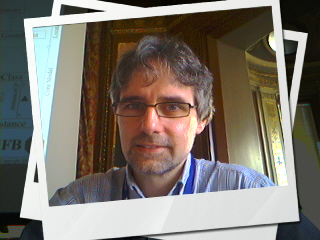
Michael Decker, University of Karlsrue, Germany
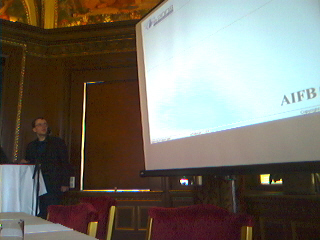
21 October 2008
eChallenges 2008
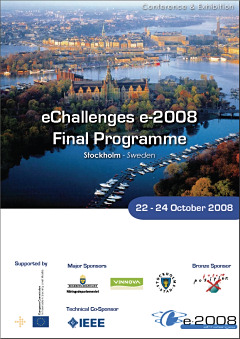
I am here in Stockholm for the first day of the eChallenges 2008 conference tomorrow, Wednesday 22nd October 2008.
I have been involved in this conference series since Venice in 2001 when I presented a paper on the work of SEISS in the south east of Ireland, creating a forum for public and private sector interests to come together under an Information Society banner. The SEISS work led to a successful bid for regional broadband investment, the SERPENT project, that saw fibre installed in the regional towns and cities.
Since then I became involved in the Technical Programme Committee and I have watched as this conference has matured and grown, where it now regularly has over 600 delegates. The core driver for the conference is the EU research programme, but the conference is much more than that.
I like the eclectic mix that this involves. You get public sector folks, working on eGovernment projects, who have one spin on things. You get lots of European industrial/commercial folks with another spin. And you also get academics who are always spinning. There are enough important decision makers from all of these areas, to make it worth coming; and enough technical people as well so that some of what is said is grounded in what is actually possible. So all in all a very enjoyable event.
Thanks to Miriam and Paul Cunningham, who've steered the conference since 2003, for keeping such a healthy balance going throughout this period.
2 November 2006
Computer Science
Steve Lohr in the NY Times discusses Computer Science and Computing, 2016: What Won't Be Possible?
The main thrust is that, despite having to struggle to establish its validity as a science, computer science has had some major impact on the world we live in, and there are many challenges still there to be met. The article was prompted by the "2016" symposium held in Washington in October 2006 and organised by the Computer Science and Telecommunications Board, which is part of the National Academies and the USA's leading advisory board on science and technology.
12 October 2006
IFUP-IT Report
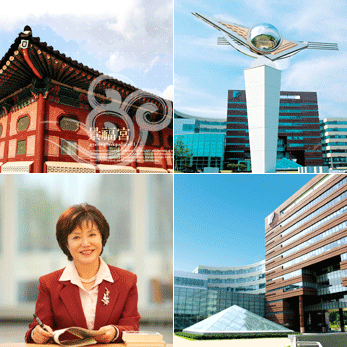
You can join in on-line if you are running Windows XP and install the client software from: IFUP-ICT 2006 On-Line.
Plenary (Day One)
I can see a trend on how the use of "Convergence" has been taken up outside the technical meaning of converged IT (Information Iechnology) and Telecommunications into ICT (Information Communications Technologies). For me the term, though vague, does have a firm technology basis of the adoption of the Internet's TCP/IP infrastructure (an unreliable packet-based data network with higher layers that introduce reliability) - thus everying becomes digital and everything uses the Internet, most dramatically telephone calls as VoIP (Voice over IP). Unna Huh, President, Information and Communications University (ICU), Korea (pictured above, bottom right) has just opened the proceedings (I am blogging from Daejeon in the audience) with a general word on the convergence of industry and academia, and many other convergences. The theme of the conference is that of the role of the academy in preparing graduates and postgraduates for this changed world, with a focus on telecommunications engineering and applied computer science "Educating IT Manpower for the 21st Century - the IT Talent that the Global Industry Desires".
Parallel 1A
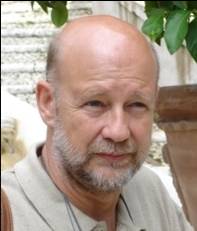
I was very interested in the presentation by Jan Rembowski (ENST, France) on the graduate programmes in Telecom Paris. They have a system of sharing elements of their postgraduate degree programmes, located in the research park in Sophie Antipolis and delivered through English.
18 October 2005
eChallenges 2005
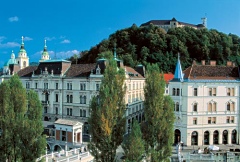
I am here in Ljubljana in Slovenia for the annual eChallenges 2005 conference. This year there are nearly 600 delegates from 46 countries, a really impressive broadening of the impact of the conference that looks at a range of issues from eBusiness, through eGovernment to Broadband and Mobile technologies.
There is a healthy delegation from the TSSG in WIT:
- myself, on the IPC and chairing a few sessions and presenting a paper on IPv6 and security inspired by our work on the Irish SFI funded Foundations of Autonomics programme;
- Brendan Jennings presenting a paper on charging for dynamically composed services;
- John Ronan presenting a paper on the EU IST FP6 SEINIT project: security for heterogeneous mobile network services;
- Robert Mullins presenting on the EU IST FP6 Daidalos project: security framework for mobile services;
- Jim Clarke presenting on the EU IST FP6 SecurIST project: the Security Task Force creating an agenda for security and dependability research in FP7;
- Sven van der Meer presenting a paper on the Irish Enterprise Ireland funded IMPRUVE project: instant messaging as a platform for the realisation of ubiquitous computing (as Sven will not be here I will present this paper).
6 February 2005
Computing Research Grand Challenges
A recent posting on the
Computing Research Policy Blog (US-based) drew my attention to this announcement on the British Computer Society (BCS) website: BCS Report on Computing Research Challenges
In fact it looks like this activity is funded by the UK Computing Research Committee, a cross professional body BCS/IEE/CPHC expert panel, with support from EPSRC and NeSC.
The process seems to have been going on for a number of years centred around the following committees, and involving some conferences to discuss progress:
GC0: Steering (Initial membership) Wendy Hall (Southampton, Chair), Robin Milner (Cambridge), Karen Sparck-Jones (Cambridge)GC1: In Vivo--In Silico
Andrew Bangham (East Anglia), Luca Cardelli (Microsoft),
Ronan Sleep (East Anglia)GC2: Science for the Global Ubiquitous Computer
Marta Kwiatkowska (Birmingham), Robin Milner (Cambridge),
Vladimiro Sassone (Sussex)GC3: Memories for Life
Andrew Fitzgibbon (Oxford), Wendy Hall (Southampton),
Ian Horrocks (Manchester), Ehud Reiter (Aberdeen), Nigel Shadbolt (Southampton)GC4: Scalable Ubiquitous Computing Systems
Dan Chalmers (Sussex), Jon Crowcroft (Cambridge),
Morris Sloman (Imperial)GC5: The Architecture of Brain and Mind
Mike Denham (Plymouth), Steve Furber (Manchester),
Mark Lee (Aberystwyth), Murray Shanahan (Imperial),
Aaron Sloman (Birmingham)GC6: Dependable Systems Evolution
Cliff Jones (Newcastle), Peter O'Hearn (Queen Mary),
Jim Woodcock (York)GC7: Journeys in Nonclassical Computation
Samson Abramsky (Oxford), Andrew Adamatzky (W. of England),
Susan Stepney (York), Jon Timmis (Kent)
This is a good overview of basic research challenges in the Computer Science space, with some overlap into other disciplines.
24 January 2005
EU Says Bureaucracy Hurting IT Research Efforts
ComputerWeekly notes EU Says Bureaucracy Hurting IT Research Efforts, Competitiveness
"The panel said the research was vital for competitiveness but that it more investment and less bureaucracy are required for success.The panel was chaired by former Portuguese science minister Jose Mariano Gago, who was one of the authors of the European Commission's 10-year Lisbon Strategy, which aims to make the EU the "world's most dynamic and competitive economy."
Viviane Reding, European Commission information society and media commissioner, said, "Fast-changing IST research is, and must remain, a key driver for the rapid economy-wide technological innovation on which Europe's skilled jobs ultimately depend."